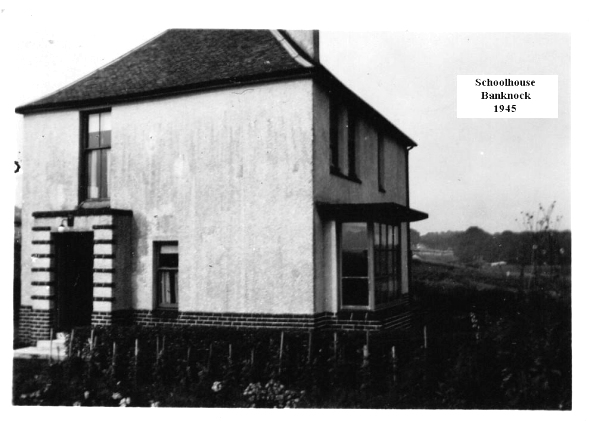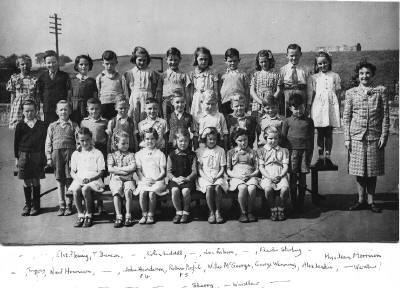'Schoolhouse Banknock was, and still is to this day, a lovely villa,
surrounded by, wonderful farmland forplaying in or sledging down, and
burns to guddle in.

Click on the map for larger image
However when we
arrived it was still war-time and restrictions were all too evident -
Ration Books controlled our consumption of good meat - sausages on a
Saturday were a real treat - minimal amounts of sweeties were
occasionally obtainable from the wee shop that Mrs Sherman kept in the
lobby of her ground-floor flat in Streetville - just across the waste
ground that served as a sort-of fitba' park for the local youth when 'jaikets'
were 'pit doon' for goal posts.
Our milk had to be
collected each evening in a can from Murchie's Farm at the far edge of
Coneypark Council Housing Scheme, and, as soon as we were old enough, my
sister and I took turns at walking the half mile there and back carrying
our precious cargo, then, with some bravado latterly, swinging the can
wildly in an arc to demonstrate the power of centrifugal force! Eggs
were only occasionally available to buy, even with umpteen garden
hen-runs in the village, and those procured were immediately stored by
my mother Nancy in a heavily greased pail in our walk-in larder inside
the north wall of the schoolhouse.
The School was the
distribution point for Dried Milk in big silver tins with blue lettering
as well as for the National Health bottles of Cod Liver Oil and
concentrated Orange Juice. My father JNK as the 'heedie' had the job of
storing these necessary vitamin supplements safely in his Headmaster's
Room and also the control of the allocation to all needy parents who
queued weekly for the good of their bairns.
There were few
problems with supplies of vegetables because everyone grew the necessary
varieties in their gardens - and my father proved rather good at this -
although his favourite crop was a flower - sweet peas (we soon realised
why Nancy poured water in our bedroom potties before taking them out to
the garden each morning!!) rather than the green pod type that we
plundered almost as mercilessly as we did the garden strawberries and
rasps.
Another crop that had
to be harvested (legally) by us, and of course organised by the 'heedie',
was the gathering of rose hips from surrounding hillsides on the way up
to Cannerton Brickworks - a penny a pail was our reward - and thus we
contributed to the war effort. For our own mothers' jelly making, we did
however enjoy much more the picking of brambles, despite the scarred
arms we suffered in the process.
All garden walls were
minus railings, long ago requisitioned by the MOD to make whatever our
troops needed to fight with. The occasional drone of a returning bomber
was heard nearby as pilots used the Forth and Clyde Canal to guide them
back to wherever they may have come - we never knew whether they were
friend or foe! And it became common place for my mother to serve tomato
soup and bread (only a penny a half-loaf then) at all hours to various
merchant seamen coming or going to Glasgow or Grangemouth along the
canal. When they stopped at nearby Wyndford Lock looking for sustenance
- they would spot the nearest light - our schoolhouse - and knock our
door. I think my mother's kind reputation was passed on by word of mouth
amongst these lonely sailors!
However the worst
visitors we received came in the summer of 1946 when burglars from
Glasgow (it was guessed by the 'polis') ransacked our house for clothes
while we were taking a short holiday in St. Andrews. With clothes being
on the 'ration', they were highly valued items. The only items for
wearing not taken were my dad's 'Plus-Fours' - probably because they
were so 'ken-speckle' or perhaps because nobody but JNK would ever have
been seen dead in them!
As they would say
nowadays, the winter of 1947/48 was 'something else'! Snowdrifts were
piled high for weeks; there was no safe way in or out of the village for
a time and the outdoor school 'lavvies' had to be defrosted daily with
pails of hot water from the school boiler room. Maggie Johnstone, the
school cleaner (and our beloved 'baby-sitter') and JNK worked miracles
to keep the school open that winter, while we children enjoyed the ice
caves, the sledging, and, when things cleared a bit, the super slides
that JNK allowed us to run the whole lengths of both the boys' and
girls' playgrounds. He was against snowballing because of the danger of
a stone getting into one of the icy missiles - a mistake that had cost a
friend of his in his own school days the sight of an eye. When we
children heard his reasoning we were only too quick to obey. Anyway
nobody dared defy JNK as his reputation with his Lochgelly belt was
legend even from his very occasional resort to this form of punishment!

Schoolhouse Banknock in
1945
But my
pride and joy was the school-field which I annually, not only converted
into 'Bumpy Ibrox' or 'Lumpy Lords' depending on the season, but also
made into a Mini-Wembley Olympic Stadium in 1948. This enterprise
involved my next-door neighbour pal Robin Profit and me, not only in a
great deal of planning, but also in the pinching of hundreds of bits and
pieces. The Marathon (two competitors only - Robin and me) took place in
our magnificent arena, but it started and finished with about sixty laps
of our track while in between it involved much running round local
fields, the school playground and adjacent pavements!

'Bumpy Ibrox'
Elizabeth and I seemed to catch every
disease going in these latter war years, including Scarlet Fever for me
and my needing to learn how to walk again after being confined to bed
for nearly two months in Bannockburn Fever Hospital. As one result of
this fever I underwent the very new 'cure-all' operation of removal of
tonsils and adenoids, duly performed by a surgeon uncle in Falkirk Royal
Infirmary. Chloroform haunts me to this day and although the memory of
the prescribed ice-cream in the taxi home after the operation is
soothing, the bucketful of blood I filled as a necessary result is still
a vivid 'horror movie' picture in my mind.

Class Photo of P4/5 1947/48
The village schooling was great, as were
school concerts, ‘Kitchen Showers’ and the like held by various village
organisations in the school as the only meeting place locally. But I’ll
never forget the excitement as a mad-keen footballer, and the school
'goalie' eventually in Primary 5, of meeting my hero, 'Geordie' Young,
captain of both Glasgow Rangers and Scotland, at a match on the village
blaes football pitch atop the local 'bing' in honour of Banknock
United's winning the Scottish Juvenile Cup.

